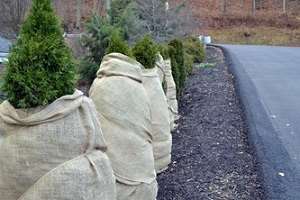Evergreens provide year long interest in the landscape and are normally pretty hardy during the winter months.
Evergreens near a high use roadway are wrapped with burlap to give some protection from damaging salt spray.

Evergreens near a high use roadway are wrapped with burlap to give some protection from damaging salt spray.
But evergreen plants can be in peril when planted next to roadways. Look in almost any landscape and you will notice that it contains evergreens. Evergreens are the workhorse in the landscape as they can act as a screen from a nearby neighbor or absorb sound from passing traffic. This time of year wildlife, especially birds, use it as a source of shelter. A row of evergreens will help to break up the winter winds.
Along roads and driveways, salt is typically applied shortly after snow removal. Salt works great and soon melts any remaining ice or snow into a liquid. Usually this saltwater mix drains off to the side but there are times when a passing car splashes that saltwater onto nearby plants. Excessive salt on the plant can burn the needles or evergreen leaves (think rhododendron) and possibly damage next year's growth.
When designing or re-designing a landscape avoid planting evergreens that are sensitive to salt spray. Some plants to avoid for those areas include hemlocks, Norway and white spruce, and white pine. Junipers, firs, and most other pines have some tolerance to salt, although no plant is completely tolerant—excess salt will damage any plant.
What are the options with plants already in place? Avoid using salt if possible. Remove snow and throw down sand for traction. If a de-icing agent is needed, avoid anything that contains sodium, such as rock salt. Although they are more expensive, use products that contain calcium chloride or calcium magnesium acetate.
Another alternative is to throw up some sort of barrier between the pavement and evergreen plant. Plastic fencing or burlap is effective in minimizing salt exposure to landscape evergreens. The aesthetics of the winter landscape is now a bit "off" but the evergreens will have less salt spray damage. Excessive salt buildup in the soil also causes damage to plants; however, the rainy spring season leaches most of it through the soil profile before it can do any damage.
Source: psu.edu